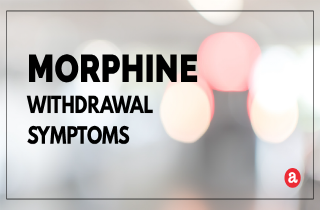Here, we discuss withdrawal symptoms of morphine and why they occur. We’ll review what you can expect during morphine withdrawal and how long morphine withdrawal symptoms last. If you have any more questions about morphine withdrawal, how morphine addiction is treated or getting morphine addiction help, we invite you to ask us in the comments section below.
Why do morphine withdrawal symptoms occur?
Morphine is one of the most effective and frequently prescribed opioid analgesics to help manage extreme chronic pain. However, you can become physically and psychologically addicted to the drug quickly. Why?
Physical tolerance to and/or dependence on morphine can develop within a couple of weeks of using morphine regularly. Physical dependence occurs when the central nervous system normalizes to the presence of morphine and chemically compensates for the chemical in the brain. When you stop taking morphine, the central nervous system needs time to recalibrate its chemistry; this is why morphine withdrawal symptoms occur when you miss a dose or stop taking morphine after a period of dependency.
What are symptoms of morphine withdrawal?
Since morphine creates physical as well as psychological dependence, the user may exhibit both types of withdrawal symptoms. Not everyone displays all of the symptoms and some may even exhibit symptoms other than those listed below. Additionally, it is important not to confuse symptoms of morphine withdrawal with symptoms of morphine addiction. The two sets of symptoms are distinct.
Psychological symptoms of morphine withdrawal
- anxiety
- depression
- difficulty getting to sleep and staying asleep
- dizziness
- drug craving
- feelings of being generally unwell (malaise)
- panic attacks
- restlessness
- suicidal thoughts
Physical symptoms of morphine withdrawal
- abdominal cramps
- diarrhea
- dilated pupils
- flu like symptoms such as sneezing, runny nose, weakness, body ache and chills
- goose bumps
- heightened sensitivity to pain
- increased blood pressure
- increased heart rate
- itching
- muscle cramps
- nausea and/or vomiting
- restless legs syndrome
- sweating
- tremors
- yawning
Morphine withdrawal symptoms: How long?
The duration of morphine withdrawal typically depends upon several factors: the reason for morphine use, the duration of use, its dose, and also the personality of the user and other psychosocial factors. The duration of withdrawal symptom for morphine will also depend upon whether the user is psychologically dependent upon the drug. The acuity of symptoms will also depend upon whether a user goes off it cold turkey or in a phased manner. But generally, morphine withdrawal resolves within 7-10 days after cessation of use. Post acute withdrawal symptoms (PAWS) can take weeks or months to resolve.
Morphine withdrawal symptoms treatment
Treatment for morphine withdrawal may require medical supervision; in some cases, even the care of an inpatient treatment center is recommended. It isn’t just about helping the user through the withdrawal phase but helping them take control of their life again and emerging as a productive, empowered and autonomous member of society once again. Some of the more medically-based morphine withdrawal symptom treatments include:
Detox – It is recommended that users should go off any opiates in a phased manner (tapering). This helps to ease the withdrawal symptoms and also improves chances of preventing relapse. The important thing is to prevent abuse of morphine and to achieve abstinence. A detox clinic (outpatient) or an inpatient treatment facility (rehab center) will help a person who is severely addicted or who tried to kick their habit only to relapse.
Natural treatments – There is some anecdotal evidence that massage, yoga, acupuncture and other alternative therapies can help treat symptoms of morphine withdrawal. While this is not supported by adequate clinical evidence, these therapies could improve relaxation and lower stress, thereby contributing to treatment. Massage can also help to ease sore muscles and with pain management to an extent.
Medications – Medications such as buprenorphine (Subutex/Suboxone) or naltrexone can be prescribed during morphine withdrawal. Over the counter medications can help ease the flu like symptoms, pain and other discomforts of withdrawal.
Therapy – Behavioral therapy, group or family therapy can be very useful during and after the stages of morphine withdrawal. To begin with, the therapist can guide a user though detox and the initial stages of abstinence. Then, the therapist will uncover and try to resolve issues or mental conditions that trigger use and other dangerous behaviors. Therapy will also try and pinpoint codependent behavior within the family and help identify enabling influences. Therapy can help an addict develop healthy responses to stress so that triggering events don’t push the addict into a relapse.
Self help – Support groups such as Narcotics Anonymous can be hugely beneficial for opiate addicts or people addicted to morphine. SMART Recovery (Self Management and Recovery Training) helps addicts abstain from addictive behaviors using cognitive behavior therapy (CBT) techniques. Joining such self help groups helps in coping in cravings, building motivation, problems solving, stress management and lifestyle balance.
Morphine withdrawal symptoms questions
Still have questions about morphine withdrawal? Please leave your questions in the comments section below. We do our best to respond to all questions personally and promptly.









Related Posts